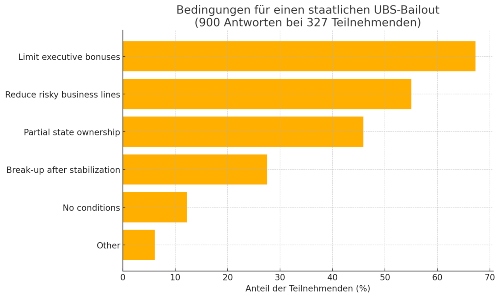What If: Should the Federal Government Also Bail Out UBS?
The last major bank bailout by the Swiss government was just over two years ago – but what if, at some point in the future, UBS were to face a crisis? The results of a survey with over 300 participating entrepreneurs show a nuanced picture. Almost half would not want to bail out UBS; however, if public funds were to be used to stabilize the bank, it should only happen under strict conditions.
What should the Swiss Federal Council do if, in a few years or decades (hopefully never), the major bank UBS were to fall into a severe crisis? That’s the question behind a hypothetical but not impossible scenario explored in a special survey conducted by the research institute Connect4B.net, founded over ten years ago by CEO Stefan Lang. The survey was part of its monthly business and banking monitor.
The results offer a valuable gauge of sentiment among business leaders, especially in light of the Federal Council's measures announced in early June to mitigate the «too big to fail» (TBTF) issue concerning systemically important banks.
Can a Major Bank Be Wound Down Like a Regular Company?
The survey was conducted online in the second half of May and is based on the responses of 325 wealthy entrepreneurs from Switzerland and 900 participants from Germany, the UK, and France (all with more than 3 million euros in freely investable assets earned through entrepreneurial activity).
The special topic concerning UBS was presented only to the Swiss participants.
In the event that Switzerland’s last major bank were to fall into a serious crisis, two-fifths of respondents preferred the approach of restructuring UBS like any normal company or liquidating it through bankruptcy proceedings.
Policy Principles vs. Reality
That would also be, from a regulatory standpoint, the least problematic option. However, this path was rejected by the Federal Council in the case of Credit Suisse in March 2023 – despite the Swiss financial regulator Finma having stated in March 2022 that both major banks had made «progress in global resolvability» and deemed their emergency plans as implementable.
With that decision, the credibility of Switzerland’s TBTF framework took a hit. Organizational measures, operational processes, liquidity management, and emergency planning were all key components meant to enable the restructuring or orderly resolution of a bank in crisis without requiring government assistance – while preserving economically vital functions.
Returning to the survey: only 24 percent believe that the Federal Council should intervene to stabilize the institution financially, as it did with UBS in 2008 and Credit Suisse in 2023.
Could the Financial System Withstand UBS’s Collapse?
Opinions are divided on whether the collapse of UBS would endanger the stability of the Swiss financial system. 43 percent believe it could jeopardize the entire system, while 35 percent expect severe but manageable consequences – and 10 percent believe the system could handle such a failure without issue.
Also revealing is the assessment of the Federal Council’s crisis management capability. A narrow majority of 53 percent said they were very or somewhat confident that the government could manage a major banking crisis effectively. However, 40 percent expressed skepticism.
Strong Majority Supports Conditions on Executive Compensation and Bonuses
Crisis scenarios always raise the question of conditions tied to taxpayer-funded bailouts. The most widely supported condition (71 percent) is the restriction of executive bonuses and compensation. Also enjoying strong backing are clawback provisions – i.e., repayment of previously paid salaries and bonuses by board members (67 percent) – and a reduction in high-risk business areas (57 percent). Support for government equity participation or breaking up the bank was lower, at 28 and 25 percent respectively.
Source: Connect4B.net
The results fall within a range one might expect for such a hypothetical and complex scenario – the downfall of Switzerland’s last major bank. According to Stefan Lang, however, the special survey was worth conducting: «What was previously only assumed is now empirically confirmed by the results.»
US Tariff Policy: Less Impact on Switzerland Than on Other European Countries
A second special topic of the survey addressed US tariff policy. A full 60 percent of Swiss businesses reported no direct impact on their operations so far. However, more than a quarter are indirectly affected through suppliers or pricing. Swiss firms are significantly less affected (around 3 percent) than their counterparts in France (12 percent) or the UK (6 percent) – whose views were also included in the survey.
This aligns with another finding: 47 percent described the mood in their own industry in response to the new US tariff policies as «calm», while 28 percent declined to give a definitive answer.
However, when it comes to the content-based rejection of US tariff policy, Swiss businesses are aligned with those in other European countries. For 63 percent of Swiss entrepreneurs, the policy causes more harm than good. Only about 10 percent support it, citing the protection of US industry as justification.





























